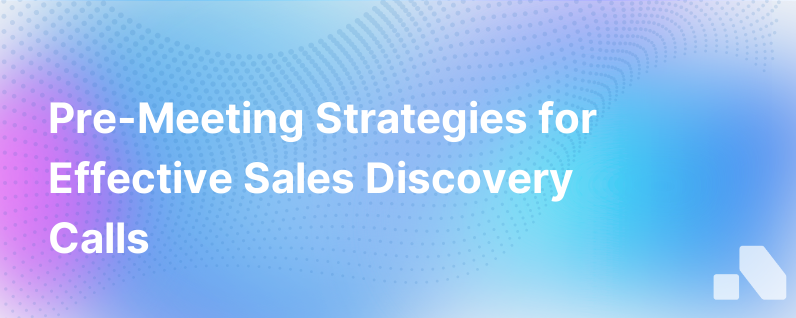Pre Meeting Tips Better Sales Discovery Calls
Published on August 8, 2023 by David Zhang
The foundation of any successful B2B sale is a solid discovery call. This initial conversation is where the sales professional has the prime opportunity to transform a lead into a prospect — and eventually, into a customer.
However, preparation and technique are critical; a poorly executed discovery call can lose a potential customer before they're even truly in the funnel. To ensure you conduct effective discovery calls, here are nuanced, actionable pre-meeting tips that will pave the way for better sales outcomes.
Understanding the Purpose of Discovery Calls
A discovery call is not just a preliminary conversation; it's a strategic meeting orchestrated to qualify a lead, understand their needs, unravel their pain points, and establish the groundwork for a meaningful relationship. A successful discovery call sets the tone for all subsequent interactions.
Pre-Meeting Checklist for Effective Discovery Calls:
1. Extensive Research on the Lead
Know the Company: Understand the lead's business environment. Look into their industry, company size, market position, competitors, and any recent news that could influence their needs or pain points.
Understand the Prospect: Use resources like LinkedIn to grasp who you'll be speaking to. Learn their role, responsibilities, influence within the company, and any professional accolades or content they've shared.
2. Review Historical Interactions
Delve into your CRM and study any prior communications with the lead. Analyze the data to find any patterns, past concerns, or interests they've demonstrated. This knowledge can guide the direction of your conversation.
3. Prepare Insightful Questions
Draft a list of open-ended, consultative questions that demonstrate your knowledge of their industry and interest in their specific challenges. Quality questions might include:
- "What challenges are you currently facing in your role?"
- "How does your current process impact your team's productivity?"
- "What criteria will define success for a solution in your view?"
4. Set Clear Objectives
Establish clear, measurable goals for the call. Direct the conversation by knowing what you want to achieve, whether it's simply to qualify them, discover a particular pain point, or move them to the next step in the sales funnel.
5. Refine Your Value Proposition
Develop a precise, compelling value proposition that speaks directly to the identified needs and challenges of the prospect. This message should be adaptable, allowing you to refine it further during the call based on the insights you gather.
6. Align with Marketing
Ensure you're up-to-date with any marketing materials or campaigns the lead may have encountered. This coherence between sales and marketing efforts can build a consistent narrative and improve trust.
7. Know Your Competitors
Anticipate comparisons with competitors by understanding how your offerings differ. Highlight your unique benefits without disparaging competitors, maintaining a professional and consultative approach.
8. Prepare Tools and Resources
Have your CRM, note-taking apps, and any other relevant tools open and ready. Make sure you can smoothly move between them without causing undue delays or distractions during the call.
9. Rehearse Potential Scenarios
Anticipate and role-play different responses to your questions. Practicing these scenarios helps in responding thoughtfully and maintaining control of the conversation direction.
10. Check Technological Set-Up
Technical difficulties can derail the best-prepared call. Ensure your internet connection is stable, your audio and video equipment is working, and you're comfortable with the meeting platform being used.
11. Create a Comfortable Environment
Your physical environment can influence the call's quality. Minimize background noise, and ensure your background is professional and distraction-free.
12. Establish Your Mindset
Approach each call with a mindset of helping rather than selling. This consultative approach focuses on creating value for the prospect, building trust, and fostering a relationship.
13. Develop a Follow-Up Plan
Be ready to propose next steps as the call concludes. Having a template or basic structure for a follow-up email can help you quickly capitalize on the conversation's momentum post-call.
14. Memorize Key Differentiators
Even if you don't directly quote them, knowing your products' or services' key differentiators by heart enables you to weave these points seamlessly into conversation as relevant problems or goals are discussed.
15. Tempo and Control
Finally, while not strictly 'pre-meeting', head into each call with a plan for controlling the tempo. The discovery call should be a dialogue, not a monologue. Balancing active listening with controlled guidance is key to keeping the conversation productive and engaging.
In Summary:
A discovery call is an art that balances preparation and adaptability. By following these pre-meeting tips, you can create a refined process that leads to discovery calls that not only uncover the essential information but also build a strong rapport with the lead.
Furthermore, fostering the skill of conducting productive discovery calls can significantly improve your sales success rate. Perfecting the nuances of a discovery call will help convert leads into prospects and, eventually, loyal customers.
While preparation is paramount, always leave room for the natural ebb and flow of conversation. Sales is about human connection, and discovery calls are where these connections start to form and solidify. And if you're looking for a robust AI platform to assist in streamlining your pre-meeting research, providing competitive insights, and personalizing sales content efficiently, Aomni may be the right solution to integrate into your sales strategy.